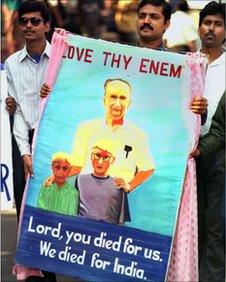India court backs life term for Graham Staines murderer
- Published

Mr Staines and his sons were burned alive
The Indian Supreme Court has upheld the life sentence of a man convicted of killing Christian missionary Graham Staines and his two young sons in 1999.
Prosecutors had argued that Dara Singh should face death - the sentence originally awarded by a lower court.
Australian Graham Staines and his sons were burned alive by a mob in 1999 in a village in the eastern state of Orissa, where he worked with leprosy patients.
Hardline Hindu groups had accused him of forcibly converting poor Hindus.
The two-judge Supreme Court bench turned down federal prosecutors' demands for the death sentence, saying the case of Dara Singh was not "the rarest of the rare" - the only justification for handing down the death penalty in India.
"We hope Mahatma Gandhi's vision of religion playing a positive development integrating into a prosperous nation will be realised," the judges said.
"There is no justification for interfering in someone's belief through force, conversion or false premise that one religion is better than the other."
Mr Staines had spent 30 years working with leprosy patients in Orissa. His sons were aged eight and 10 at the time of their murder.
Christian community leaders accused a militant Hindu group, the Bajrang Dal, over the killings, but an official inquiry found no evidence that any one group was behind the attack.
After a lengthy trial Singh and 12 others were convicted in 2003. But the High Court in Orissa commuted his death sentence two years later.
It also freed 11 others given life terms in prison, saying there was not enough evidence to support their convictions.